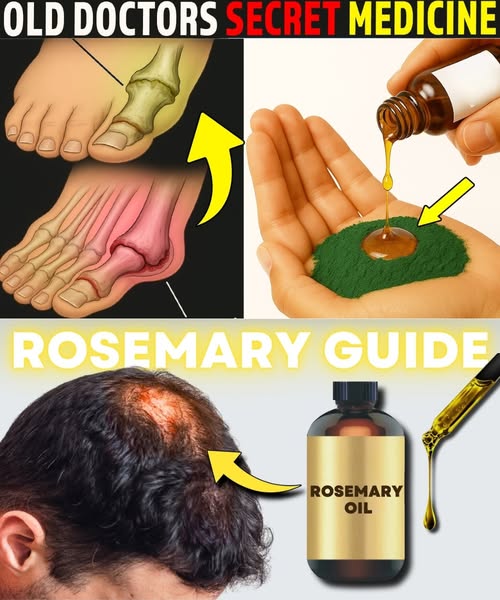Introduction
For centuries, old doctors and traditional healers have trusted the power of rosemary oil. Today, modern science is finally catching up with what ancient wisdom already knew: rosemary oil is not just a fragrant herb oil—it’s a potent natural remedy with extraordinary healing potential. From boosting memory to reducing inflammation, balancing hormones, fighting infections, and even promoting hair growth, rosemary oil has earned its title as one of nature’s most versatile health elixirs.
But here’s the exciting part—old doctors claim that rosemary oil can help address up to 21 different health issues in just 7 days! Sounds incredible, right? In this comprehensive guide, we’ll explore those health benefits, explain how to use rosemary oil safely, and answer frequently asked questions to help you unlock its full potential.
If you’ve been searching for a natural, affordable, and effective solution for common health problems, this article will show you why rosemary oil might be the golden key hidden in your pantry.
Why Rosemary Oil Is So Powerful
Rosemary (Rosmarinus officinalis) is more than a culinary herb. Its oil contains bioactive compounds like cineole, camphor, and rosmarinic acid, which give it antioxidant, anti-inflammatory, antimicrobial, and neuroprotective properties.
According to recent studies, rosemary oil:
- Boosts circulation and oxygen supply to tissues
- Reduces oxidative stress and cell damage
- Balances hormones and supports the nervous system
- Acts as a natural pain reliever and antimicrobial agent
This is why traditional doctors trusted it as a “universal remedy” long before pharmaceutical drugs existed.
21 Health Issues Rosemary Oil Can Help Treat in Just 7 Days
Here are 21 conditions that old doctors claim rosemary oil can help relieve quickly:
1. Memory Loss and Brain Fog
Rosemary oil is known as the “memory herb.” Inhaling its aroma increases mental clarity and boosts concentration. Studies suggest it enhances cognitive performance by improving blood flow to the brain.
2. Stress and Anxiety
A natural stress-buster, rosemary oil reduces cortisol levels. Diffusing it for just 15 minutes daily can promote calmness and relaxation.
3. Headaches and Migraines
Massaging diluted rosemary oil on the temples eases headaches by relaxing tense muscles and improving circulation.
4. Hair Loss and Dandruff
Clinical trials show that rosemary oil stimulates hair follicles, thickens hair, and reduces dandruff. Compared to minoxidil, it has fewer side effects.
5. Joint Pain and Arthritis
With its strong anti-inflammatory properties, rosemary oil relieves swelling and pain in joints when massaged with a carrier oil.
6. Muscle Soreness
Athletes and fitness enthusiasts use rosemary oil for quick recovery. It soothes sore muscles and boosts circulation after workouts.
7. Respiratory Issues
Its expectorant properties help clear mucus and open airways. Inhaling rosemary oil steam may ease coughs, asthma, and bronchitis.
8. Indigestion and Bloating
Applied topically (diluted), rosemary oil supports digestion, reduces bloating, and relieves stomach cramps.
9. High Blood Sugar
Studies suggest rosemary oil extracts help regulate blood sugar by improving insulin sensitivity.
10. Weakened Immunity
Its antimicrobial power helps fight infections naturally, making it a must-have during flu season.
11. Skin Aging and Wrinkles
Rich in antioxidants, rosemary oil combats free radicals that cause premature aging, helping skin stay youthful.
12. Acne and Pimples
Its antibacterial nature reduces acne-causing bacteria and controls excess oil on the skin.
13. Poor Circulation
Massaging rosemary oil improves blood flow, warming cold hands and feet.
14. Low Energy and Fatigue
Inhaling rosemary oil acts as a natural energy booster, improving alertness without caffeine.
15. Menstrual Cramps
Massage around the lower abdomen can significantly reduce menstrual pain.
16. Hormonal Imbalances
Rosemary oil supports hormonal health, especially for women experiencing PMS or menopause.
17. Bad Breath and Oral Health
Its antimicrobial activity freshens breath and helps fight gum infections when used in diluted mouth rinses.
18. Liver Detox
Rosemary oil stimulates the liver, aiding detoxification and promoting better digestion.
19. Cellulite Reduction
When massaged into the skin, rosemary oil may help break down fat deposits and improve skin elasticity.
20. Sleep Problems
Although energizing during the day, rosemary oil also reduces anxiety, leading to deeper and more restful sleep at night.
21. Wound Healing
Its antiseptic properties accelerate healing and reduce infection risk when applied (diluted) to cuts and scrapes.
How to Use Rosemary Oil for Maximum Results
To experience the benefits within 7 days, follow these methods:
- Inhalation: Add a few drops to a diffuser for stress relief, memory boost, and energy.
- Topical Massage: Dilute with coconut or olive oil (2–3 drops per teaspoon) for pain relief, circulation, and skincare.
- Hair Treatment: Mix with a carrier oil and massage into the scalp 2–3 times per week.
- Steam Inhalation: Add 3–4 drops to hot water, cover head with a towel, and inhale deeply to clear airways.
- Mouth Rinse: Add 1 drop to a cup of warm water for oral hygiene (do not swallow).
⚠️ Important Note: Rosemary oil should always be diluted before skin application. Avoid internal use unless guided by a qualified professional.
Frequently Asked Questions (FAQs)
1. Can rosemary oil really work in just 7 days?
Yes. Many users report noticeable improvements—such as reduced stress, better sleep, and improved hair health—within a week of consistent use. However, long-term use brings the most lasting benefits.
2. Is rosemary oil safe for everyone?
Rosemary oil is generally safe, but it should not be used by pregnant women, people with epilepsy, or those with high blood pressure without medical advice.
3. How often should I apply rosemary oil to my scalp for hair growth?
For best results, massage diluted rosemary oil into the scalp 2–3 times per week. Studies show significant results after 3–6 months of regular use.
4. Can rosemary oil replace prescription medicine?
No. While rosemary oil supports health naturally, it should not replace prescribed medications. Instead, it works best as a complementary therapy.
5. What’s the best way to store rosemary oil?
Keep it in a dark glass bottle, away from direct sunlight and heat, to preserve its potency.
Key Statistics That Highlight Rosemary Oil’s Power
- A 2015 clinical trial found rosemary oil as effective as 2% minoxidil for treating hair loss after 6 months.
- Research published in Therapeutic Advances in Psychopharmacology showed that inhaling rosemary oil improved memory speed and accuracy by 75%.
- Studies confirm rosemary oil contains over 40 antioxidant compounds, making it one of the most powerful natural protectors against cell damage.



